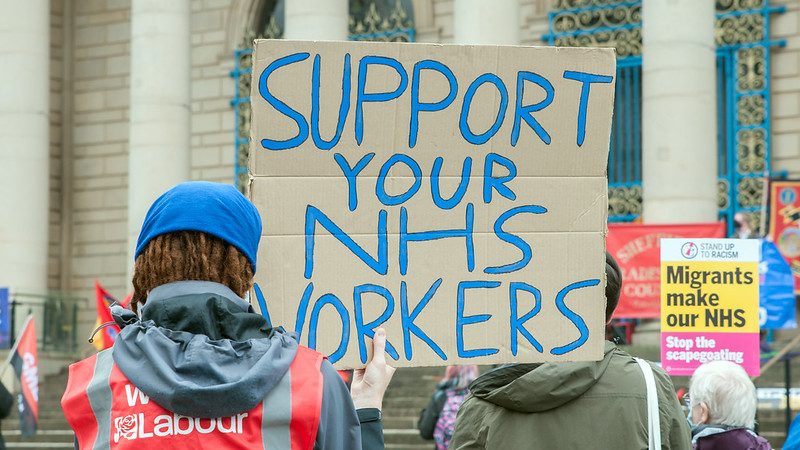Unite the union announce escalation of NHS strikes

Health unions have voted to accept the government pay offer today which will affect one million NHS staff in England.
The majority of unions voted to accept the government’s offer of a 5% pay rise and one-off sum of at least £1,655.
Representatives from 14 health unions met with the government to vote, before the pay deal was signed off during the NHS Staff Council.
Health secretary Steve Barclay announced he intends to implement the offer which should be received from next month, whilst the NHS Staff Council have said they will now work in partnership with the government to implement the additional non-pay elements of the offer set to support the NHS workforce.
However, this does not mark the end of NHS strikes.
Following the decision, Unite the union announced they will in fact be escalating their NHS strikes despite the staff council vote.
They are the only health union with a current mandate for industrial action, which effects more than 4,000 NHS workers across England who are members of Unite.
Unite general secretary Sharon Graham said the vote is not binding on individual unions and therefore won’t stop the union representing the interests of their members.
“Unite’s NHS members have spoken and they rejected the deal,” said Graham. “Because of this, Unite used its seats on the staff council to also vote against it. In fact, we will be escalating strike action.”
She also urged the prime minster to ‘stop hiding, step in and solve this dispute’.
“The current offer will not solve the huge issues surrounding understaffing that are destroying the NHS and Unite’s members have their union’s absolute backing in fighting against it.
“It’s now time for the government to reopen negotiations. The prime minister needs to stop hiding, step in and solve this dispute.”
Whilst the Royal College of Nursing (RCN) has issued a letter to Steve Barclay saying their union will also remain in formal dispute with the government and the NHS over pay.
Pat Cullen, RCN general secretary, wrote: “I entirely respect those, in our membership and that of other unions, who voted to accept.
“However, that was not the prevailing view of nursing staff. Nursing is the largest part of the NHS workforce and they require an offer that matches their true value.”
Cullen warned minsters yesterday not to underestimate nurses resolve for action and that the union still wishes to meet the health secretary to negotiate on an additional offer.
The RCN will now re-ballot members, who make up 280,000 NHS staff in England, for further strike action.
If they reach sufficient support, they will have a legal mandate to take industrial action again across the NHS.
Other unions have used the offer agreement to warn the government about what now needs to be done to save the underfunded health system.
Head of health at the union Unison, Sara Gorton, warned that the NHS still remains ‘desperately short of staff’ and that services will continue to struggle with growing demand if the government now fails to work with unions to tackle the issues.
She condemned the government’s approach to the pay disputes and hoped the pay deal could signify something new in the NHS.
“Proper pay talks last autumn could have stopped health workers missing out on money they could ill afford to lose,” said Gorton. “The NHS and patients would also have been spared months of disruption.
“This pay deal must be the start of something new in the NHS. There cannot be a repeat of the past few months.
“Everyone who cares about the NHS deserves better. That means improving the process that sets health worker wages.
“The NHS remains desperately short of staff too. Services can only cope with growing demand if there’s a properly resourced and well-supported workforce.
“Government must now work with unions to achieve just that.”
GMB union welcomed the offer as a ‘first step in the long journey’ to dealing with the fundamental issues facing NHS workers.
GMB union welcomed the offer as a ‘first step in the long journey’ to dealing with the fundamental issues facing NHS workers.
They outlining a series of concerns affecting ambulance services which the government would need to now address including; better funding for mental health and social care, addressing unsocial hours and reforming the Pay Review Body.
These were the first steps towards restoring NHS workers’ ‘decade of lost earnings’ and to ‘provide the public with the health service they deserve’.
Hannah Davenport is trade union reporter at Left Foot Forward
Left Foot Forward’s trade union reporting is supported by the Barry Amiel and Norman Melburn Trust

To reach hundreds of thousands of new readers we need to grow our donor base substantially.
That's why in 2024, we are seeking to generate 150 additional regular donors to support Left Foot Forward's work.
We still need another 117 people to donate to hit the target. You can help. Donate today.



